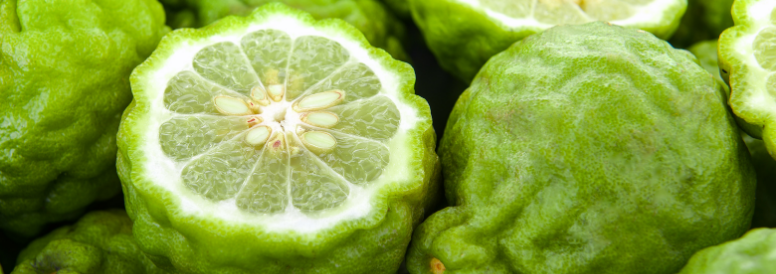Bergamot for Cardiovascular Health
There are a variety of ways to support your patients’ cardiovascular health, with the best research in the field repeatedly suggesting a plant-based, whole-food diet being the foundation. A wide array of fruits and vegetables provide the magnesium, potassium, and other nutrients for smooth-muscle function and endothelial health. Green leafy vegetables that are low in oxalates but rich in calcium and magnesium—such as kale and collard greens—are good options. And broccoli, Brussels sprouts, bell peppers, citrus, kiwi, and berries provide important amounts of the vitamin C necessary for collagen production.
is the common name of the fruit Citrus bergamia, which grows on small trees along the coastal regions of southern Italy. The bitter but aromatic bergamot fruit is about the size of an orange and the color of a lemon or lime, depending on ripeness.
Bergamot has traditionally been prized for its oil, for example Earl Grey tea gets its distinctive flavor from oil extracted from the bergamot rind. Bergamot essential oil is also widely used in perfumes, deodorant, and .
In recent years, researchers have begun exploring the potential that bergamot fruit and juice extracts may support .
BERGAMOT FLAVONOIDS
Bergamot fruit contains a unique array of polyphenolic flavonoids, which distinguish it from other These flavonoids include neoeriocitrin, neohesperidin, naringin, rutin, melitidine, and brutieridine.
Standardized bergamot fruit extracts contain specific concentrations of flavonoids. Bergavit™ provides at least 28 percent flavonoids, with specified amounts of neoeriocitrin, neohesperidin, and naringin. Bergamonte™ provides at least 25 percent flavonoids, with 1 percent melitidine and 2 percent brutieridine. Some bergamot products also state that they contain a standardized concentration of bioactive polyphenolic fractions (BPF).
BERGAMOT AND CHOLESTEROL
In 2011, Filoteropia published the results of the first two human clinical trials of bergamot for .
One trial involved 238 subjects who took 1,000 mg of BPF or a placebo for 30 days. Bergamot was found to support healthy total cholesterol, LDL cholesterol, triglycerides, and HDL cholesterol. The second trial involved 32 participants. The researchers found that 1,500 mg of bergamot extract per day supported healthy cholesterol levels in these subjects.
A study published in 2014 in Advances in Biological Chemistry found that bergamot also supports healthy subfractions of cholesterol. This placebo-controlled trial reported that 1,300 mg per day of BPF supported healthy size and density of LDL subfractions, as well as other biomarkers of liver health.
The most recent clinical trial on bergamot and cholesterol metabolism was published in 2015 in Frontiers in Pharmacology. The study confirmed the earlier finding that bergamot supports healthy size and density of LDL subfractions.
Eighty study participants took Bergavit™, providing 150 mg of flavonoids per day (16 percent neoeriocitrin, 47 percent neohesperidin, and 3 percent naringin). Results showed that six months of Bergavit™ supplementation supported healthy total cholesterol, LDL cholesterol, triglycerides, HDL cholesterol, and LDL subfractions.
BERGAMOT AND VASCULAR HEALTH
Although bergamot has been studied most extensively in the context of lipid balance, its polyphenolic flavonoids are also likely to support via antioxidant pathways.
The 2015 Frontiers in Pharmacology study offered some evidence that bergamot supports not only healthy cholesterol, but also healthy vasculature. A novel discovery from that study was that bergamot extract supported healthy carotid intima thickness.
BERGAMOT MECHANISMS
Studies in animals suggest that bergamot flavonoids balance cellular metabolism by modulating sirtuin-1 (SIRT-1), protein kinase C (PKC), and peroxisome proliferatoractivated receptors (PPAR). These pathways mediate fatty acid , LDL receptor expression, and translocation of the LDL receptor across cell membranes.
It’s also been proposed that bergamot flavonoids support lipid metabolism by interacting with 3-hydroxy-3- methylgutataryl coenzyme A (HMG-CoA) reductase. Butieridine and melitidine are HMG derivatives of hesperetin and naringenin, and are similar in structure to HMG-CoA reductase substrates.
Finally, bergamot flavonoids have been shown to support healthy inflammatory balance and antioxidant activity. A clinical trial of BPF found that its polyphenolic fractions supported inflammatory and antioxidant balance in the blood vasculature.
SUGGESTED USE
When choosing a bergamot supplement, the standardization and concentration of flavonoids are more important than the total amount of bergamot fruit. Products containing Bergavit™, Bergamonte™, and BPF all contain standardized extracts.
Clinical trials of bergamot extracts have evaluated intakes of 500 to 1,500 mg per day. These amounts, taken for 30 to 60 days, appear to be safe. However, bergamot does have the potential to lower blood sugar levels, so use caution in situations in which blood sugar regulation is a concern.
Most clinical trials have evaluated bergamot alone, but some have combined it with standard cholesterol support ingredients. One trial combined bergamot with additional plant polyphenols and found that the mixture supported healthy cholesterol levels.
Although bergamot oil has been used for centuries in Italian folk traditions, extracts of the fruit have only recently attracted the attention of clinicians and researchers. More studies are needed, but early evidence suggests that bergamot extract offers promise for supporting cholesterol and cardiovascular health.

